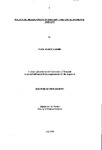POLITICAL DEALIGNMENT IN BRITAIN : THE LOCAL EVIDENCE 1959-1979
| dc.contributor.author | LAMBE, PAUL JAMES | |
| dc.contributor.other | Faculty of Arts, Humanities and Business | en_US |
| dc.date.accessioned | 2013-10-07T10:15:15Z | |
| dc.date.available | 2013-10-07T10:15:15Z | |
| dc.date.issued | 2003 | |
| dc.identifier | NOT AVAILABLE | en_US |
| dc.identifier.uri | http://hdl.handle.net/10026.1/2052 | |
| dc.description.abstract |
This thesis challenges the dominant view that municipal elections tell us practically nothing about the preferences and attitudes of the voter to local issues and events, that municipal elections are no more than national referendums. It suggests that the influence of socio-economic environment and political context and indeed structural factors have hitherto been underestimated. It argues that municipal politics and voting behaviour impact upon parliamentary electoral behaviour and outcomes and thereby the politics of place impinge upon the national electoral level. The thesis employs a multi-disciplinary approach that combines the qualitative research methods of the historian and the quantitative statistical analysis of the political scientist to unravel the interactions between the politics of place and voting behaviour in Britain between 1959 and 1979 at a time of dealignment at the parliamentary level and increased politicisation of elections at the municipal level. Patterns and trends in party support at parliamentary elections in four constituencies were analysed using quantitative methods and contrasted with patterns and trends in party support at municipal elections in coterminous electoral units. Significant variance between the two levels of electoral activity was evidenced. The research then employed qualitative methods and evidence from four case studies was presented that local contextual factors could account for much of the disparity between municipal and national patterns of party support in these locations. Quantitative research methods were resumed and the statistical techniques of multivariate regression and logistic regression employed to analyse socio-economic, political and structural variables in relation to party support at municipal and parliamentary elections in the case study areas. The findings of the quantitative analysis corroborated much of the qualitative findings and the conclusion reached that the influence of contextual factors upon party support at municipal elections has been underestimated Furthermore, that the interdisciplinary methodology employed is one that others in both political science and history may fruitfully follow to the advantage of both disciplines. | en_US |
| dc.language.iso | en | en_US |
| dc.publisher | University of Plymouth | en_US |
| dc.title | POLITICAL DEALIGNMENT IN BRITAIN : THE LOCAL EVIDENCE 1959-1979 | en_US |
| dc.type | Thesis | |
| plymouth.version | Full version | en_US |
| dc.identifier.doi | http://dx.doi.org/10.24382/4263 |
Files in this item
This item appears in the following Collection(s)
-
01 Research Theses Main Collection
Research Theses Main


